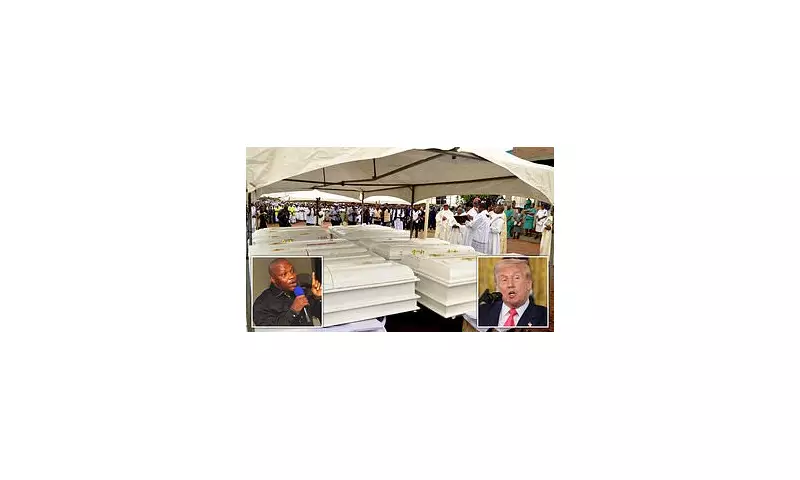
Silent Genocide Threatens Nigeria's Christian Population
A chilling prediction has emerged from Nigeria, where human rights campaigner Emeka Umeagbalasi warns that the country's Christian community faces potential extinction within two generations without immediate international action. The founder of Nigeria's International Society for Civil Liberties and Rule of Law (Intersociety) claims a systematic genocide has been unfolding across Africa's most populous nation for nearly two decades.
Umeagbalasi describes what he calls a 'long-running, coordinated campaign' of killings, kidnappings and church burnings primarily carried out by Islamist militants. In an exclusive interview with the Daily Mail, he stated unequivocally: 'If you look at the clear-cut definition of genocide, it fits the present reality on the ground in Nigeria.'
Pattern of Violence and Destruction
The veteran activist paints a disturbing picture of Nigeria under siege, with Fulani jihadists having infiltrated or laid siege to 35 of the country's 36 states. He estimates that approximately 150,000 Christians have been killed over 16 years, mostly by Fulani militants, Boko Haram and the Islamic State West Africa Province (ISWAP). Another 30,000 Muslims have also perished in the violence.
Umeagbalasi's research teams document a consistent pattern of attacks: striking at night, shooting everyone in sight, burning churches, destroying farms and forcing survivors to flee. The scale of destruction is staggering - he claims 20,000 of Nigeria's estimated 100,000 churches have been destroyed in approximately a decade.
The violence continues unabated. In late October, armed men believed to be militant Fulani herders stormed farming villages on the Plateau-Kaduna border, shooting indiscriminately at villagers, torching homes and leaving bodies scattered across fields. Dozens were reported killed and wounded according to International Christian Concern.
Government Complicity and International Response
Perhaps the most explosive allegation concerns the role of Nigerian security forces. Umeagbalasi claims they're not merely failing to protect Christian communities but are sometimes perpetrators. 'In every place we investigate, people tell us the same thing: the problem we have here is the military,' he reveals.
He describes security forces arriving hours after attacks, when killers have vanished, then arresting victims or raiding traumatised communities. 'The complicity of the Nigerian security forces is glaring,' he asserts, suggesting powerful actors in Abuja want to reshape Nigeria into an 'Islamic homogeneous state.'
The Nigerian government vehemently denies these allegations, insisting violence stems from banditry, ethnic disputes, climate pressures and weak policing rather than religious persecution. Foreign Minister Yusuf Tuggar called state-backed religious persecution 'impossible' under Nigerian law.
Former US President Donald Trump has threatened to cut off aid or even send in American military forces unless Abuja acts swiftly to stop what he termed 'mass killings of Christians.' Presidential spokesman Daniel Bwala dismissed these threats as 'coercive' and 'misleading.'
Complex Crisis or Religious Persecution?
Experts caution that blaming everything on 'Christian genocide' oversimplifies Nigeria's complex security crisis, which includes insurgents in the northeast, bandits in the northwest, communal clashes in the middle belt, and farmer-herder conflicts stretching from Benue to Kaduna.
The respected Armed Conflict Location and Event Data Project (ACLED) records about 53,000 civilian deaths from political violence since 2009, affecting Christians and Muslims alike. However, Umeagbalasi stands by his figures, gathered by teams travelling village to village, counting bodies and documenting what he calls a 'staggering, relentless campaign.'
He warns that large Christian areas are being systematically erased - emptied village by village, leaving behind ghost towns and charred sanctuaries. 'By 2075 Christians will have been uprooted from Nigeria,' he predicts grimly.
Umeagbalasi calls for targeted sanctions, asset freezes and visa bans against Nigerian political elites, noting their reliance on American bank accounts, European travel and British healthcare. He also supports 'surgical' US military strikes on militant camps, arguing this would prevent a Rwanda-style catastrophe that could engulf West Africa.
As Nigeria - a nation of 250 ethnic groups and two major religions - buckles under overlapping crises, its Christian population remains caught in the crossfire, with the world still struggling to determine where advocacy ends and hard evidence begins.





